Doug Anderson, SVP, Research & Development
SUMMARY: A likely future for the U.S. in the year 2020 and beyond is a country split between the aging Baby Boom still with substantial political, economic, and social power, and a young, fast-growing multi-cultural population with far less political and economic clout. Beyond the clear demographic trends, the starting points for this divide can be seen in the growing generation gap that can be measured in the attitudes and behavior of Americans today.
In 1969, a Gallup poll found 74% of Americans thought there was a generation gap. That gap manifested itself throughout U.S. society in the social and political upheavals of the 1960s and early 1970s. Things
| 79% of Americans think there is a generation gap… |
settled after that and 10 years later in a CBS/New York Times poll, only 60% saw a generation gap. Today, 30 years on, a Pew Research Center poll finds that 79% of Americans think there is a generation gap. While the 1969 gap was driven by widely varying points of view between younger and older Americans about the war in Vietnam, race relations, and women’s rights, today’s gap is centered around a different set of issues.
The Pew poll finds that Americans of all ages believe that differences in values make up most of the generation gap. Differences in morality, ethics, politics and beliefs/religion are frequently mentioned by younger people, while older folks are much more likely to say there are big differences around a sense of entitlement—that younger people want everything handed to them. Interestingly, only 8% of 18–29 year-olds and 5% of all other ages, mention differing levels of reliance on technology as being divisive, despite the fact that adoption and use of technology wildly varies across generations.
You’re old when…
Did you ever wonder what life would be like when you grow old? While the perception of “old” varies by age group—18–29 year olds think you’re old when you turn 60!—the generation gap of 2009 is focused primarily on the ability of younger persons to understand the large group of aging Baby Boomers.
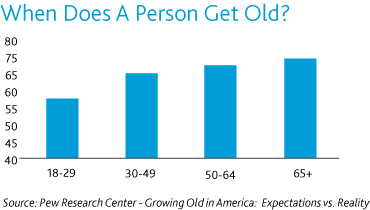
Younger people exaggerate both the challenges of growing old and the benefits. For example, 57% of younger persons expect to have some memory loss after the age of 65, while only 25% of those aged 65+ actually experience memory loss. Likewise, 87% of 18–64 year olds feel that older people have more time for hobbies and other interests, while only 65% of persons over the age of 65 actually find that extra time in their lives.
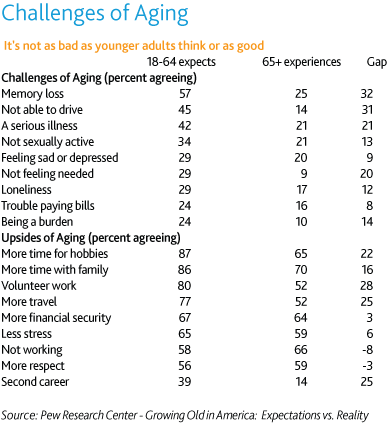
Secular states
Religion plays a more central role in people’s lives as they age—and is a clear dividing issue between younger and older Americans today. Less than half of those aged 18–29 (44%) say religion is an important part of their lives, but that percentage escalates by about 10 points with each increasing age increment—54% of 30–49 year olds agree, 61% of those aged 50–74 feel the same, and 70% of persons 75+ believe.
Similar patterns of church attendance can be seen in the Catholic faith. Many younger Catholics consider religion important, but attendance at Mass falls off substantially compared to older persons. There is, however, a slight increase in weekly Mass attendance for Millennials born after 1981 compared to those born between 1961 and 1981. Around one-third of U.S. Catholics are Hispanic, with many of them concentrated in the younger ages—the up-tick may be due to the influx of younger Hispanics into the church.
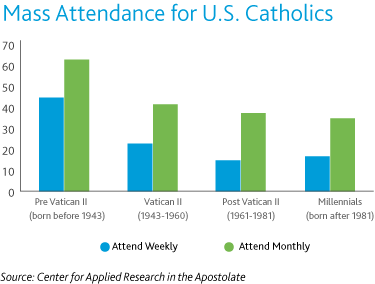
The gloom of the boom
For three decades, data from the General Social Survey, conducted by the National Opinion Research Center at the University of Chicago, have shown the Baby Boom generation to have experienced less happiness than other age cohorts—new data from Pew show this is still the case. Their consistent gloomy attitudes have separated them from both preceding and subsequent generations of Americans.
| The Baby Boom generation experience less happiness than other age cohorts… |
Baby Boomer’s rate their overall quality of life lower than other age cohorts—they worry that incomes won’t keep up with inflation, that it is harder to get ahead today than it was 10 years ago, and that their standards of living don’t exceed that of their parents at the same age. Fewer Boomers expect to be able to live comfortably in retirement than members of other age cohorts.
These findings are surprising considering the fact that Boomers have the highest incomes of any age cohort, the highest home values, and the highest net worth. In today’s recession, however, they also have the most to lose and have been hit the hardest by the collapse of the housing and equity markets. Many are financially stretched still supporting children, their parents, or both.
Why are the Boomers the gloomiest generation? One possible explanation is supported by published sociologist, Yang Yang. Her work suggests that the roots of the issue may lie in the size of the Baby Boom generation. Because of the unexpectedly large size of their cohort, Baby Boomers have had to compete with each other for admission to schools, for jobs, etc., and this added level of competition has increased the level of stress in their lives and lowered their overall levels of happiness.
Technology and media
Whether young people feel it differentiates them from older persons or not, adoption of technology and use of both traditional and new media varies substantially between older Americans and new emerging youth
| Adoption of technology and new media varies substantially… |
markets.
Average monthly television viewing time varies strongly by age. Although younger persons still watch a substantial amount of television—over 150 hours per month for persons age 25–34—their viewing is dwarfed by that of older viewers. Persons over the age of 65 watch 38% more TV hours per month than those aged 25–34.
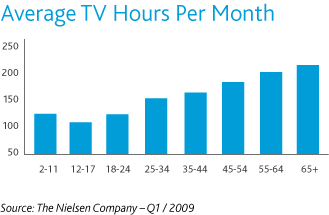
While time-shifted television programming via a DVR accounts for a relatively small share of viewing, the highest levels of adoption are among 25–44 year olds, who watch time-shifted programming 24% more than 45–64 year olds and over four times more than persons aged 65+.
The Internet is a more ubiquitous medium with persons over the age of 35—averaging more than 40 minutes a day from home. Younger persons spend somewhat lower amounts of time online from home in an average day, but are the strongest adopters of other forms of technology—such as the mobile telephone. In 2008, the average teenager sent or received over 35,000 text messages a year—about one message every 15 minutes, 24 hours a day, 365 days a year. That’s 163 times more than the average person aged 65+.
Young persons are also much more likely to have abandoned their land lines in favor of an all mobile life. The chart below shows the distribution of persons by age based on how they make use of land and mobile telephone lines.
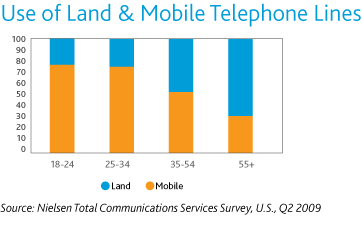
The U.S. in 2020 will be a very different marketplace from 2009, and the roots of that change are everywhere. The aging of the Baby Boom is inevitable. And in much the same way as they have redefined what it means to be young and to be middle aged, they will also redefine what it means to be old.
Other demographic trends that will shape the future are also present today—growth in Hispanic and Asian populations, with the highest shares among younger people, and falling fertility rates and falling family sizes. Beyond demographics, the gap between the generations, while clearly defined in differing usage of media and technology, has deeper roots too—in values, outlooks, and political perspectives.
Sources:
Center for Applied Research in the Apostolate (Frequently Requested Catholic Church Statistics) – Georgetown University
Baby Boomers: The Gloomiest Generation (Pew Research Center – Pew Social & Demographic Trends Project June 25, 2008)
Yang Yang—Social Inequalities in Happiness in the United States, 1972-2004: An Age-Period-Cohort Analysis—American Sociological Review April 2009
Growing Old in America: Expectations vs. Reality (Pew Research Center—Social & Demographic Trends Report June 29, 2009)
How Teens Use Media —The Nielsen Company, June 2009
A2/M2 Three Screen Report—The Nielsen Company, 1st Quarter 2009



